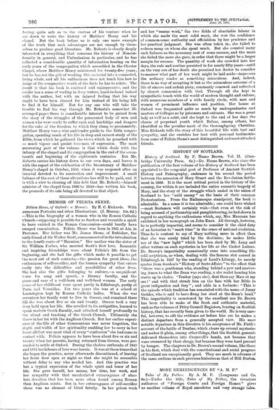HISTORY OF SCOTLAND.
History of Scotland. By P. Hnme Brown. Vol. II. (Cam- bridge University Press. 6s.)—Dr. Hume Brown, who since the publication of the first volume of his History of Scotland .has been appointed to the congenial post of Professor of Ancient Scottish History and Palseography, embraces in his second the period between the accession of Mary Stuart and the Revolution Settle- ment in 1689. It is the most critical period in the history of the country, for within it are included the entire romantic tragedy of Mary, and the story of the struggle which ended in the union of Scotland to her "auld enemy" on the basis of their common Protestantism. From the Hallamesque standpoint, the book is admirable. In a sense it is too admirable; one could have wished —most Scotsmen will certainly wish—that even at the risk of being accused of partisanship and pamphleteering, he had shown in regard to anything the enthusiasm which, say, Mrs. Maccunn has exhibited in her monograph on John Knox. All through, however, he is perfectly impartial, and seems to consider it the chief duty of an historian to "mark time" in the sense of national evolution. Thus ho is content to say of Mary nothing more in effect than that she was sorely tried by the destinies ; he makes little use of the "new light" which has been shed by Mr. Lang and other writers on such mysteries in her life as the Casket Letters. Dr. Brown's impartiality occasionally runs into something like cold scepticism, as when, dealing with the famous riot caused in Edinburgh in 1637 by the reading of Laud's Liturgy, ho merely quotes from Gordon's "History of Scots Affairs" to the effect that "there was a gentleman who, standing behind a pew and answer- ing Amen to what the Dean was reading, a she zealot hearing him starts up in choler. `Traitor (says she), dost thou say Mass at my ear: ' and with that struck him on the face with her Bible in great indignation and fury" ; and adds in a footnote : "This is the episode which tradition has associated with the name of Jenny Geddes, who is said to have flung her stool at the Dean's head." This impartiality is occasioned by the excellent use Dr. Brown has been able to make of the fresh and authentic material, such as the volumes of Privy Council Registers, bearing on Scottish history, that has recently been given to the world. He is very care- ful, however, to sift the evidence set before him ore ho makes a distinct departure from a generally accepted view. His most notable departure in this direction is his acceptance of Mr. Firth's account of the battle of Dunbar, which clears up several mysteries and makes it plain, among other things, that the Scottish generals delivered themselves into Cromwell's hands, not because they were overawed by their clergy, but because they were hard pressed by hunger. The chapters in Dr. Brown's second volume, like those in his first, which deal with the constitutional and social progress of Scotland are exceptionally good. They are much in advance of the same sections in such previous histories as that of Hill Burton.


















































 Previous page
Previous page